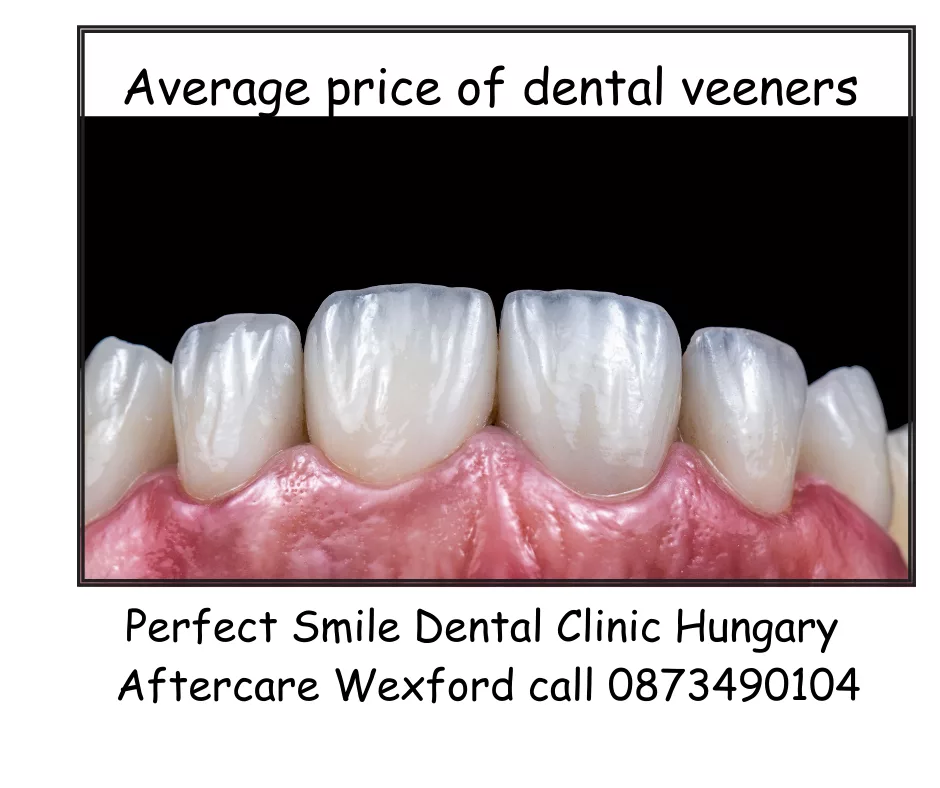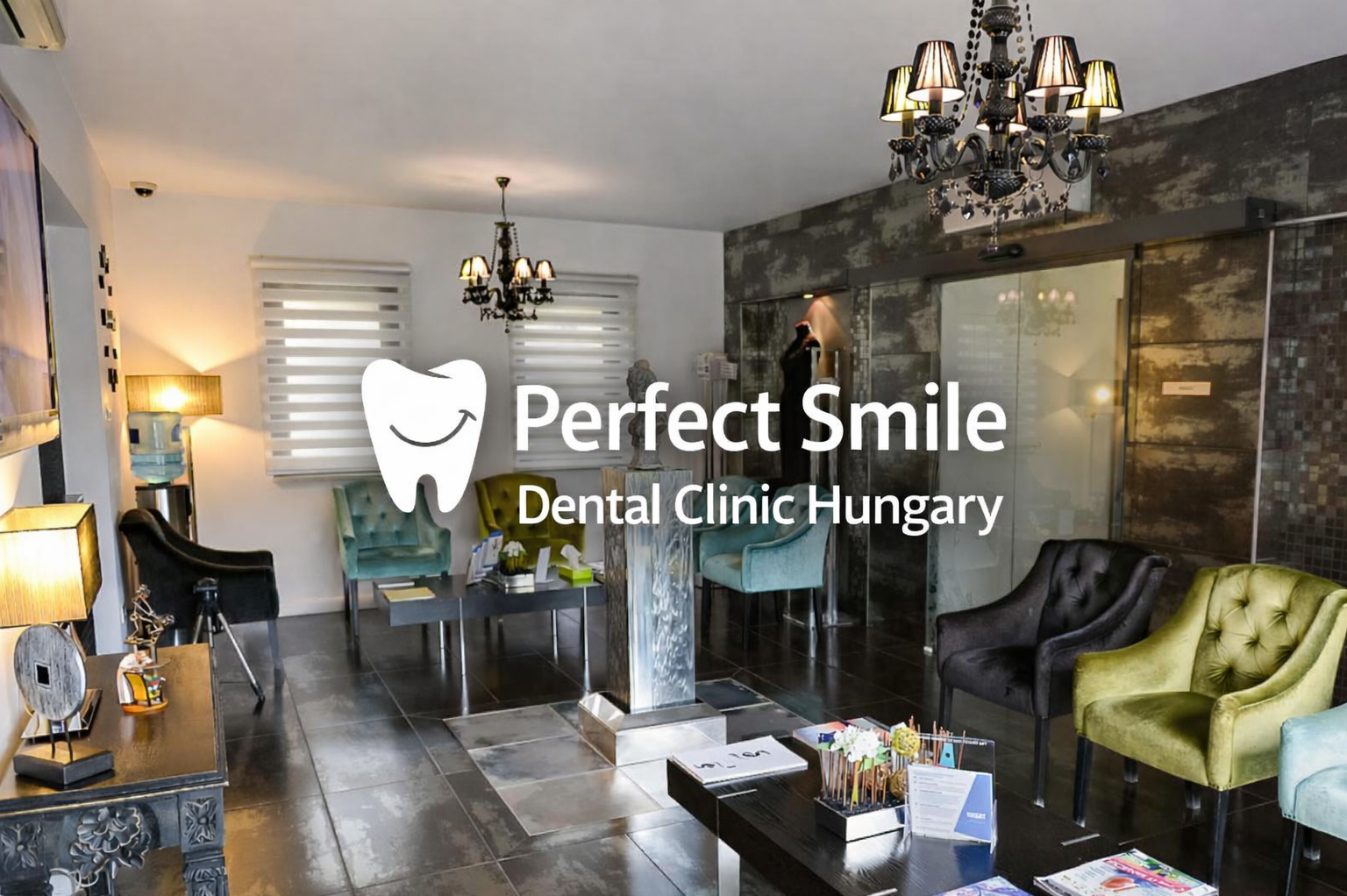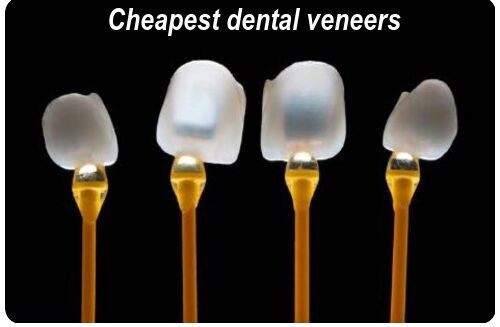Average price of dental veeners
Average price of dental veeners in Ireland ranges from €475 to €600 per tooth.
Dental veneers can be very expensive, if you believe that they can help the appearance of your smile then this article will help you.
Find out more about average price of dental veeners and learn how you can save money on dental veneers.
Travel to Europe where dental veeners cost so much less than in Ireland.
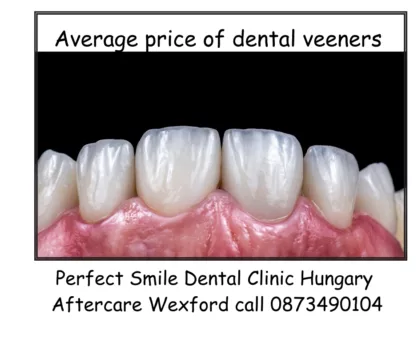
What is a veneer
A dental veneer is a casing over a tooth that is bonded to the tooth in order to improve the appearance of the tooth.
A veneer is used to enhance or take care of aesthetic issues, for example damaged, fractured, smaller than average or discoloured teeth.
Dental veneers are typically composed of porcelain or composite resin and are adhered permanently to the teeth.
In the case of a fractured or cracked tooth, some patients may receive a single veneer.
Most patients receive between six and eight veneers to create an even, symmetrical smile.
Veneers are most commonly placed on the upper eight front teeth.
To save money on veeners and to a get professional treatment call Fintan at Hungarian Dentists Wexford on 0873490104 for more information.
What are the various kinds of veneers?
When considering the average price of dental veeners it’s important to look at the types of material used.
Dental veneers are typically fabricated from porcelain or composite resin, and they require extensive preparation.
However, there are “no-prep” veneers, which are administered via a distinct method.
Traditionally, applying dental veneers necessitates paring down the tooth structure and, in some instances, even removing enamel.
This provides for correct placement, but it is an irreversible procedure that is often excruciating and requires local anesthesia.
Tooth reduction is contingent on the patient’s dental issues and the number of teeth involved.
When multiple teeth are involved, a dentist may order a plaster model to demonstrate the appearance of veneers.
No-prep veneers, on the other hand, may require minimal tooth modification or preparation.
Call Fintan at Hungarian Dentists Wexford on 0873490104 for more information.
Porcelain veneers cost
Some dentists will begin by reducing the size of the teeth before taking an impression of them to create a casting.
The mold will then be sent to a laboratory where the porcelain veneer will be fabricated.
Once the veneer is available, your dentist can cement it to the tooth that has been prepared.
Normally you are fitted with temporary veneers until the laboratory have completed your new permanent veneers.
Porcelian veneers are popular the average price is around €500 per tooth.
In the meantime, other dentists may use CAD/CAM technology to have the veneer designed by a computer.
Your dentist can fabricate the veneer in his or her facility.
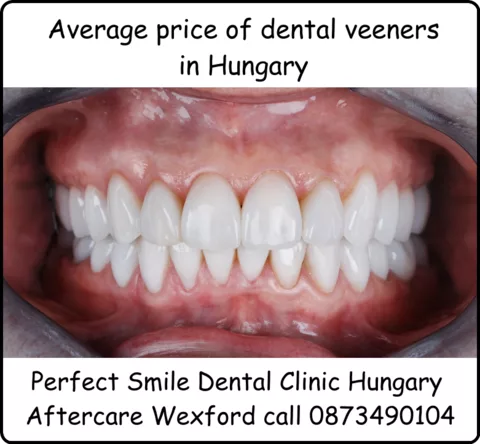
Composite resin veneers
If you opt for the average price of dental veeners and you pick composite resin veneers, your dentist will etch the tooth’s surface before applying a fine layer of the composite material to the tooth’s surface.
Additional composite layers may be required to obtain the desired aesthetic.
The composite veneer will be cured, or hardened, by your dentist using a special light.
No-prep veneers
There are options such as Lumineers and Vivaneers, which are specific porcelain veneer manufacturers. They are less invasive and require less time to apply.
No-prep veneers do not require the removal of tooth structure beneath the enamel.
No-prep veneers typically do not require local anesthesia or interim veneers.

Which veneer is the best?
How do you determine which veneer variety is ideal for you?
You should consider the following factors:
- Cost duration of the installation procedure
- The look of the veneers
- The durability of the veneers
- Your dentist’s recommendations
Resin-based veneers are more costly.
Preparing a tooth that requires less tooth removal may necessitate multiple visits to the dentist.
Veneers are typically applied in a single visit to the dentist.
They are stronger and more durable than composite veneers; less expensive than porcelain veneers; last 5-7 years.
They are less likely to taint; are simpler to repair; and are more susceptible to damage.
Veneers: before and after
You may be surprised by how much a dental veneer can transform a fractured, split, misshapen, or discolored tooth into a tooth with a uniform shape and natural colour.
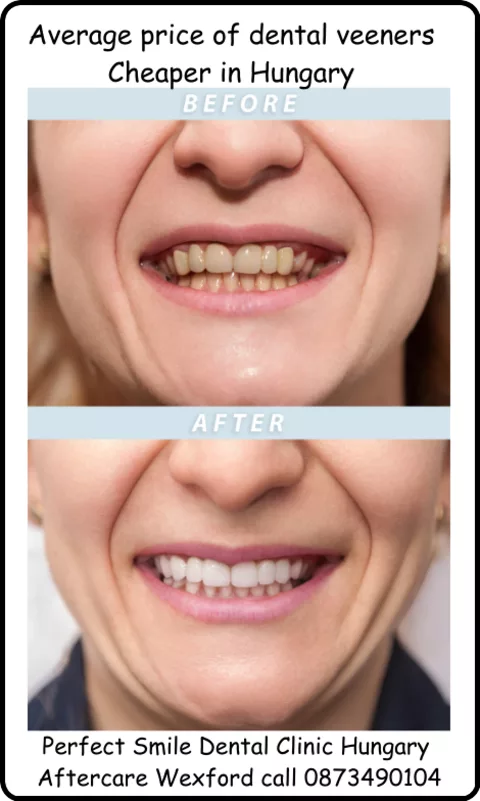
Average price for veneers?
As a cosmetic procedure, veneers are typically not covered by health insurance.
According to the Irish Dental Association, you can anticipate to pay between €500 and €600 per tooth for porcelain veneers.
Composite veneers range between €300 and €550 per tooth and have a lifespan of between 5 and 7 years.
Traditional veneers are frequently the most cost-effective option over the long term.
If the average price of dental veneers in Ireland is beyond your budget you have an option.
Why not consider calling Hungarian Dentists Wexford and ask for a consultation about the average price of dental veneers in Hungary.
You will be surprised to find that the average price of dental veneers in Hungary is €100 per tooth.
If you need a large number of teeth to be treated then you can save a lot of money by travelling to Hungary.
The average price of dental veeners and cost of depends on factors such as the type of veneers you select.
Also the brand name your dentist offers, the expense of living in your area, and the dentist’s experience.
It can be substantially less expensive if you visit a clinic staffed by dental students supervised by faculty dentists.
What are the advantages of veneers?
The greatest advantage of veneers is enhancing the appearance of your teeth, resulting in a whiter, more uniform smile.
Veneers are frequently used to remedy the following cosmetic conditions:
- Fractured or damaged teeth
- Extremely discolored or unevenly colored teeth that cannot be corrected with whitening gaps
- Smaller-than-average teeth
- Pointed or irregularly shaped teeth
Depending on the sort of veneer you choose, veneers can last for more than a decade, making them a semipermanent investment that can boost your smile confidence.
How to prepare for your scheduled consultation
Before you receive veneers, you will have a consultation with your dentist to discuss the best options including the average price of dental veeners and the number of veneers you desire.
In some instances, if teeth are misaligned or irregular, orthodontics may be required before veneers can be placed.
At this juncture, your dentist will typically capture X-rays to evaluate the condition of your teeth.
They will search for indicators of dental decay, periodontal disease, and the need for root canals.
If you have any of these conditions, veneers may not be an option for you.
At the next appointment an impression (mold) will be taken after some enamel is shaved off (0.5 millimetres) to allow the veeners to fit.
This impression is then sent to the laboratory where veneers are fabricated.
How do veneers get placed on teeth?
Typically, it takes between one and two weeks for your veneers to return from the facility after your dentist creates the impression.
Of course you will have done your homework on the average price of dental veeners.
Once your veneers arrive, you can schedule an appointment to have them bonded to your teeth.
At this appointment, your dentist examines the fit, shape, and pigment of the veneers to ensure that they are ideal.
The dentist then meticulously cleans your teeth.
This is essential because it prevents microbes from becoming confined beneath the epidermis and causing decay.
Then, they use the honing instrument to produce a coarser surface on each tooth that will receive a veneer.
This allows the veneers to fix perfectly onto the tooth.
Your dentist will then bond the veneer to the tooth using dental cement.
They will use ultraviolet light to rapidly harden this cement.
This second appointment (during which veneers are installed) usually lasts less than two hours.
However, it may vary depending on the number of veneers being placed and the use of local anesthesia.
What is the difference between dental veneers, dental crowns, and dental implants?
Veneers differ from dental implants and crowns. Crowns encase the entire tooth, whereas veneers cover only the tooth’s front surface.
Veneers are also thinner than crowns, measuring approximately 1 mm versus 2 mm.
The average price of dental veeners will be significantly less expensive than the average price of dental implants.
Moreover, veneers are less invasive.
If you require a crown, your dentist will need to file or grind down more of your tooth.
This is to prepare it for the crown than would be required for the placement of a veneer.
In the interim, an implant is inserted in the bone to replace an absent tooth, followed by the placement of a crown.
It may take several months for the area around the implant to recover sufficiently enough for the replacement tooth to be inserted on top.

How to care for your veneers after they have been inserted.
In contrast to other dental procedures, the recovery period is relatively brief.
After the veneers have been bonded and any anesthetics have worn off, you will be able to consume and mastic normally.
As the anesthetic begins to wear off, avoid gnawing on your cheekbones or tongue.
In some instances, veneers may have a slightly abrasive texture immediately after placement.
These scratchy regions (typically caused by excess cement that adheres to the veneer) diminish after several days of normal feeding and grooming.
Your dentist can flatten them out if they don’t.
Traditional porcelain veneers typically have a minimum ten-year lifespan.
Trusted Source (and some research indicates that they can last up to twenty years)reputable source), and no-prep veneers last between five and seven years.
Allowing for the average price for dental veneers to be expensive in Ireland by taking certain precautions can help ensure that you obtain the maximum lifespan from them.
Read find affordable dentists.
These safeguards include:
- Avoid chewing on rigid objects such as pens, ice, and fingernails.
- Avoid using your teeth to open packages.
- Avoid chewing with your front teeth. Consume tougher foods only with your rear teeth; cut tough foods so that this is feasible.
- If you grit or strain your teeth at night, preserve your veneers with a prosthesis or retainer.
- If you participate in sports, you ought to utilize a mouth protection.
- You should get a mouth guard or retainer if you pulverize or clench your teeth.
Conclusion
I hope that you have enjoyed reading this article on the average price of dental veneers.
As you can see prices of dental veneers can vary quite a lot, the best advice is to get a few quotes for dental veneers.
If you find the average price of dental veneers is too much consider calling 0873490104 to book a free consultation in the Wexford Dentists .
References
https://www.ncbi.nlm.nih.gov/pmc/articles/PMC6311473/
https://pubmed.ncbi.nlm.nih.gov/15119590/
